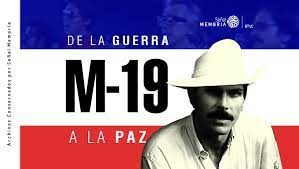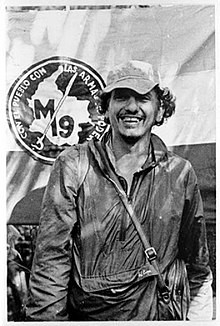The M-19 was an insurgent group active in Colombia from 1974-1990. It has recently enjoyed a brief moment of fame for careful viewers of the popular Netflix series Narcos, where it was rather simplisticallydepicted as being in cahoots with narco-traffickers. The movement is popularly understood as an urban movement and the M-19 did in fact emerge from middle class university environments in big cities like Calí and Bogota. It also carried out audacious symbolic attacks and innovative forms of communication with the Colombian population (for e.g. broadcasting its announcements on TV at half time during televised matches of the Colombian football team) in cities. What is less well known about the movement is that it also had an extensive and dynamic rural armed campaign in the south of the country. Although, smaller in number than better known groups like FARC, it achieved notable military successes by seizing regional cities and operating forms of rebel governance by providing schools, operating courts to punish criminals and re-distributing locally needed goods like wellingtons and tools.

The literature in conflict studies has emphasised how difficult it is for idealistic urban middle classes to win the support of often poorly educated and politically passive peasants. Indeed, the physical unsuitability of ‘soft’ city kids in adjusting to the hardship of rural life is often cited as a further obstacle to revolutionary movements’ success. For students interested in conflict studies, social movements and rebel governance, this is the chance to look at one of Latin America’s lesser known and often misunderstood movements. More broadly it will give students a chance to conduct research on mobilisation across the urban-rural divide.

Extensive data on the M-19’s mobilisation in Caquetá in southern Colombia is available in the National Center for Historical Memory digital archives. Students will learn about archival research, the analysis of primary sources and the coding of qualitative data. Using this data and secondary literature, students would analyse the way in which the M-19 overcame the disadvantages of its urban back ground to launch a rural guerrilla campaign. All the documents are in Spanish, so unfortunately the project is only suitable for Spanish speakers.
If you are interested in working on armed movements and can speak Spanish, please contact francis.oconnor@wur.nl

